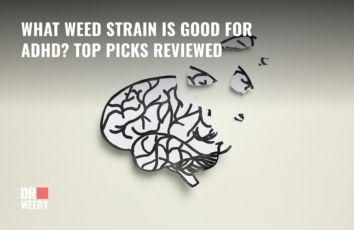Cannabis and the Immune System
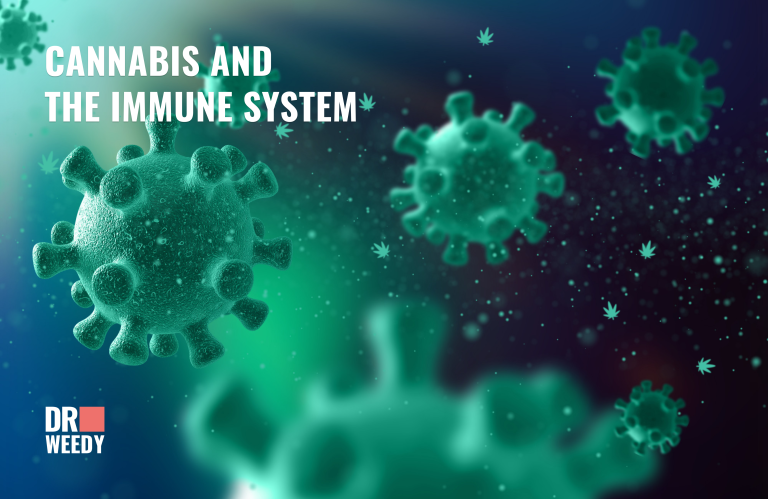
Are you curious about the relationship between cannabis and your immune system? The immune system is responsible for protecting us from harmful viruses and bacteria, and a vibrant immune system is vital for overall health and well-being. In this article, we will explore the effects of cannabis on the immune system, what research says, and the potential benefits to gain. Don’t go anywhere! Let’s see the fascinating connection between cannabis and the immune system.
What is the Immune System?
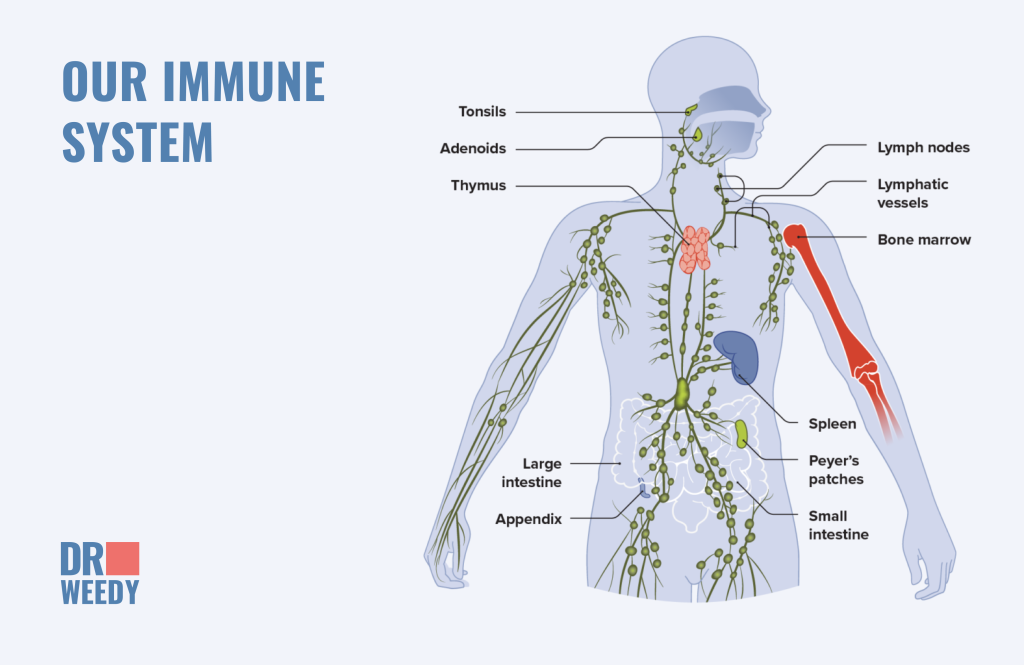
It is said that within a single cubic meter of air, there are about 1.6 million to 40 million viruses and 860,000 to 11 million bacteria. Just one cubic meter of air! —-and there are germs virtually everywhere including our skin, and on surfaces. Every day, we inhale an average of 11 cubic meters of air that can contain millions of these pathogenic organisms. It is the immune system that keeps us safe.
The immune system is a complex network of organs, cells, and proteins that defend the body against infection. It serves as our body’s first line of defense against bacteria, viruses, and other pathogens. Our immune system functions by recognizing and attacking foreign substances that enter the body, while also distinguishing between these invaders and the body’s own healthy cells. One remarkable thing about its defense mechanism is that it is able to adapt and remember past encounters with these invaders, allowing it to mount a faster and more effective response in the future.
Without a strong immune system, we will become susceptible to every germ and pathogen.
How Does Cannabis Affect the Immune System?
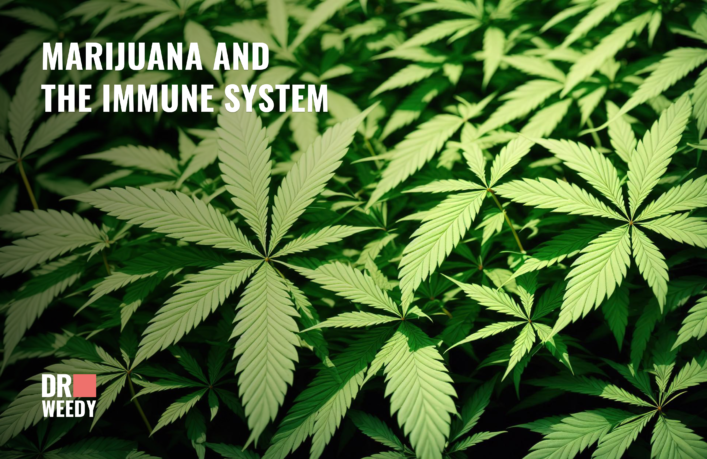
Cannabis influences our immune system through the endocannabinoid system (ECS). The ECS is a complex cell-signaling system that plays a pivotal role in regulating various physiological processes, including immunity. It consists of endocannabinoids, receptors, and enzymes that work harmoniously to maintain homeostasis in the body.
Cannabis compounds, particularly cannabinoids, interact with the ECS, influencing its functions and, consequently, impacting the immune system.
The ECS consists of three primary components:
1. Cannabinoid Receptors (CB1 and CB2)
The ECS comprises two main types of receptors, CB1 and CB2. CB1 receptors are primarily found in the central nervous system, while CB2 receptors are more prevalent in the immune system and peripheral tissues.
2. Endocannabinoids
Endocannabinoids are naturally occurring compounds produced by our bodies that bind to cannabinoid receptors. Two of the most well-known endocannabinoids are anandamide and 2-arachidonoylglycerol (2-AG).
3. Enzymes
Enzymes are responsible for breaking down endocannabinoids once they’ve fulfilled their function. The enzymes fatty acid amide hydrolase (FAAH) and monoacylglycerol acid lipase (MAGL) are essential in this process.
Does CBD Weaken the Immune System?

CBD is a natural compound derived from the cannabis plant. Unlike its cousin, THC, CBD does not possess psychoactive properties, meaning it won’t get you high. CBD is available in various forms, including oils, tinctures, edibles, and topicals, making it a versatile option for those seeking its potential benefits.
While Studies actually suggest that CBD has a suppressive effect on the immune system, it is essential to note that CBD doesn’t directly weaken the immune system. Instead, it appears to modulate or regulate its responses to produce different benefits including the following:
-
Anti-inflammation
Inflammation is a natural immune response to harmful stimuli, but chronic inflammation can be detrimental. CBD may help in reducing excessive inflammation, potentially preventing autoimmune diseases.
-
Immune Response Balance
CBD may help in maintaining a balanced immune response. It can potentially suppress an overactive immune system, which is often seen in conditions like allergies or autoimmune diseases, without weakening the overall immune function.
-
Stress Reduction
Stress can weaken the immune system. CBD’s anxiolytic (anxiety-reducing) properties may indirectly support the immune system by promoting a calmer, less stressed state of being.
-
Antibacterial Properties
Some research suggests that CBD possesses antibacterial properties. While this isn’t a direct immune system impact, it could aid in protecting the body from bacterial infections.
How Does THC Affect the Immune System?
THC is a chemical compound found in marijuana plants, and it’s primarily responsible for the plant’s psychoactive effects. When consumed, it binds to specific receptors in the brain, leading to alterations in perception, mood, and cognition.
THC primarily impacts the immune system by binding to the CB1 and CB2 receptors within the ECS. This interaction can have both suppressive and stimulatory effects, depending on various factors, including dosage and the individual’s overall health. The immune suppressive effects include inflammation reduction and pain management.
Cannabis and Autoimmune Diseases
In autoimmune diseases, the immune system is overactive and often needs to be “calmed down.” Autoimmune diseases occur when the immune system mistakenly attacks healthy cells and tissues. Conditions like multiple sclerosis, lupus, and Crohn’s disease fall into this category.
Due to the immunomodulatory effects of CBD, many have turned to cannabis as a potential treatment for autoimmune diseases as it is capable of promoting immune system balance.
CBD also helps in the management of chronic pain which is a common and debilitating symptom of many autoimmune diseases. It reduces inflammation and fatigue and promotes better sleep.
Cannabis May Also Help HIV Patients
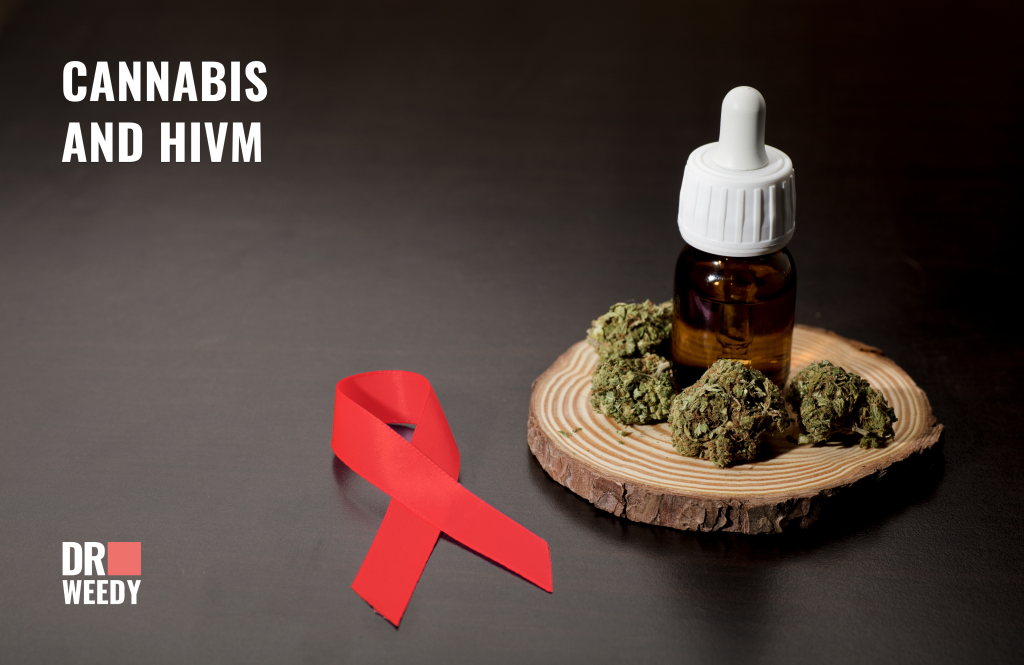
Medical cannabis is commonly prescribed for alleviating chronic pain, severe weight loss, and appetite loss—symptoms often associated with HIV. However, recent research suggests that cannabinoids may do more than just address these symptoms; they might also combat the human immunodeficiency virus (HIV). Recent studies indicate that certain components found in marijuana may actually protect the immune system from HIV. Nevertheless, it is important to consult a doctor before using cannabis for health management.
Hope in Cancer Therapy
Certain cannabis varieties, rich in CBD have been shown to induce cell destruction in tissues affected by tumor growth. In a research study by Dr. Matt Dun and the Australian Natural Therapy Group, it was discovered that certain strains of cannabis can destroy specific types of cancer cells without harming healthy bone marrow and white blood cells. Although the mechanism of action of cannabis in treating cancer is not yet fully understood, medical experts are optimistic that it could become an effective therapy for curing cancer.
Take Advantage of The Entourage Effect
One of the fascinating aspects of cannabis is the entourage effect, which highlights the synergy of various cannabis compounds when consumed together. This phenomenon suggests that the combined action of cannabinoids, terpenes, and other components may have a more significant impact on the body than isolated cannabinoids.
Final Thoughts
The action of cannabis on the immune system can be seen to be multifaceted. You have that it does not inherently weaken the immune system but rather plays a modulatory role in maintaining balance and preventing overactive immune responses.
Its anti-inflammatory and stress-reducing properties can indirectly support immune health. However, since individual responses to CBD and THC can vary, consulting a healthcare professional is advisable.
SOURCES:
- Kaplan, B. L., B. Springs, A. E., & Kaminski, N. E. (2008). The Profile of Immune Modulation by Cannabidiol (CBD) Involves Deregulation of Nuclear Factor of Activated T Cells (NFAT). Biochemical Pharmacology, 76(6), 726. https://doi.org/10.1016/j.bcp.2008.06.022
- Immune Responses Regulated by Cannabidiol | Cannabis and Cannabinoid Research. (2021). Retrieved October 23, 2023, from Cannabis and Cannabinoid Research website: https://www.liebertpub.com/doi/10.1089/can.2018.0073
- Molina, P. E., M AmedeeAngela, J LeCapitaineNicole, ZabaletaJovanny, MohanMahesh, J WinsauerPeter, … L BirkeLeslie. (2014). Modulation of Gut-Specific Mechanisms by Chronic Δ9-Tetrahydrocannabinol Administration in Male Rhesus Macaques Infected with Simian Immunodeficiency Virus: A Systems Biology Analysis. AIDS Research and Human Retroviruses, 30(6), 567–578. https://doi.org/10.1089/aid.2013.0182
- Kaplan BL, Springs AE, Kaminski NE. The profile of immune modulation by cannabidiol (CBD) involves deregulation of nuclear factor of activated T cells (NFAT). Biochem Pharmacol. 2008 Sep 15;76(6):726-37. doi: 10.1016/j.bcp.2008.06.022. Epub 2008 Jul 8. PMID: 18656454; PMCID: PMC2748879.

























